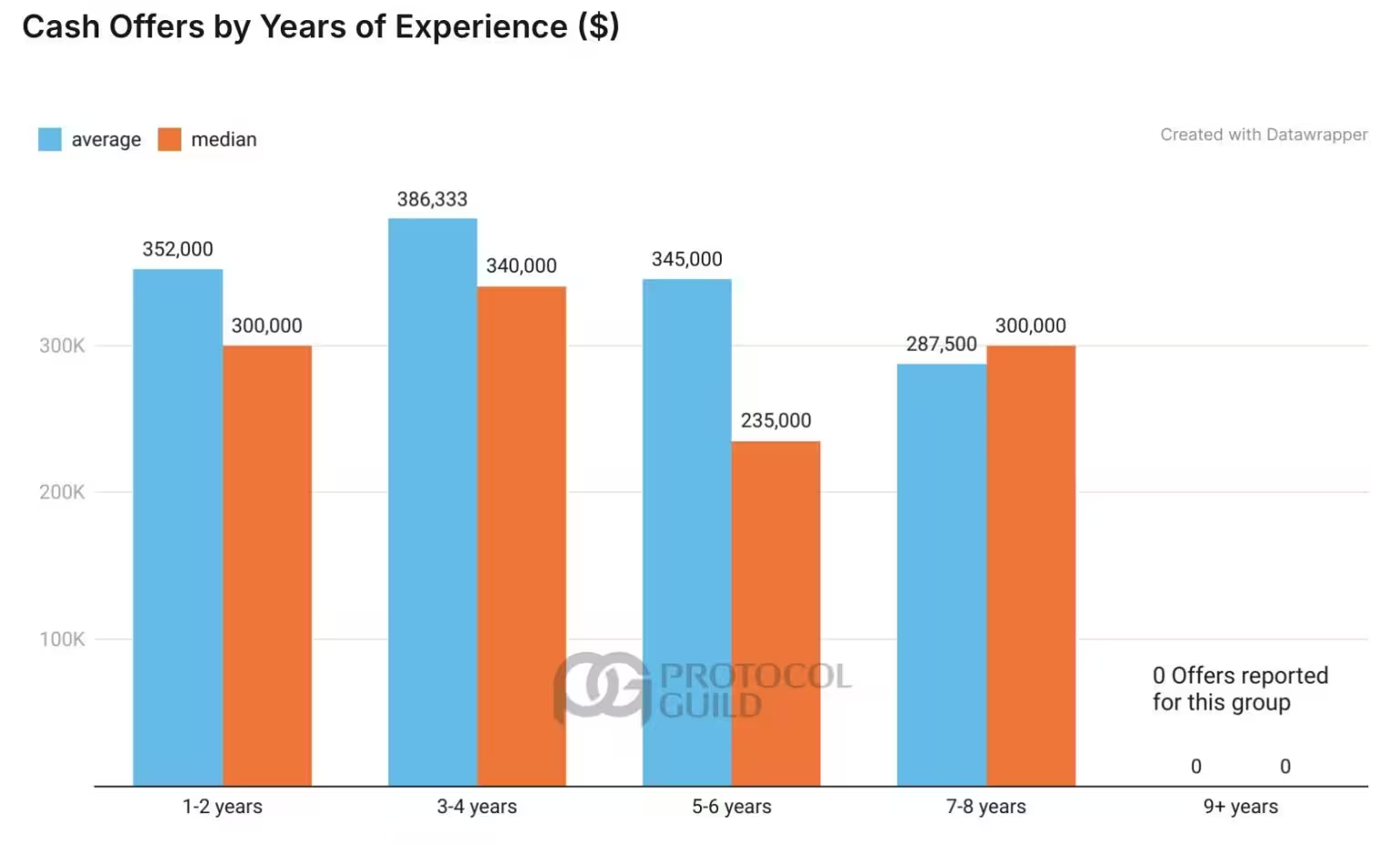5 Minutes
Ethereum core contributors face a striking pay gap
New compensation data reveals that developers who maintain Ethereum — the world’s second-largest blockchain — earn substantially less than comparable roles in the crypto industry. Protocol Guild, a collective that funds roughly 190 Ethereum core contributors, published a survey this week that provides the most detailed snapshot yet of pay among people responsible for Ethereum’s core client software, protocol research and ongoing upgrades.
Key figures at a glance
The survey, which collected responses from 111 contributors across 11 organizations, found a median base salary for Ethereum core developers of $140,000. That sits well below market opportunities, where offers have a median near $300,000 and an average of $359,000. The gap amounts to a 50%–60% shortfall versus what many engineers could command at for-profit crypto firms, Layer 1 chains, Layer 2 projects or established exchanges.
Protocol Guild’s report also highlighted that only 37% of contributors receive any form of token or equity grants from their employers, leaving most without upside typically used in the industry to attract and retain talent. One respondent reported turning down an external offer worth $700,000 to continue contributing to Ethereum core development.
Why the pay gap exists
There are several structural reasons why Ethereum core developers receive less total compensation than peers working for commercial crypto firms. Many client teams, research labs and coordinating organizations that hire core contributors are non-profits, academic institutions or foundations. These entities typically lack equity or token allocation mechanisms common at startups and exchanges, which means employees often miss out on high-upside equity compensation or on-chain token grants.

That absence of upside amplifies salary pressure. In private industry, engineers frequently receive sizable equity stakes, token allocations or both. Ethereum’s core teams, however, are often legally and operationally constrained from offering similar packages.
Protocol Guild’s role: predictable, on-chain funding
Protocol Guild aims to narrow part of the compensation shortfall. Since launching in May 2022, the collective says it has distributed over $33 million in funding. Much of that support comes from projects that pledged 1% of their token supply — including EigenLayer, Ether.fi, Taiko and Puffer — with grants that vest on-chain over four years. That on-chain vesting provides transparency and predictability that many traditional employers cannot match.
Over the past year, the median contributor received $67,121 in Protocol Guild support. When combined with base salary and other income, the overall median compensation rose to $207,121 — still below market averages, but a meaningful reduction in the gap.
Who gets paid more — and who lags?
The report identifies variation by role and experience. Researchers command the highest median cash pay at about $215,000, while client developers and coordinators report median cash compensation closer to $130,000. By tenure, those with seven to eight years in the ecosystem reported a median of $212,000; surprisingly, respondents with nine or more years saw median pay drop to roughly $150,000.
These disparities create talent pressure as competing chains and well-funded Layer 2 projects increasingly hunt for blockchain engineers. Nearly 40% of survey respondents said they received a final external offer in the past year — many from rivals able to provide larger total packages.
Risks to Ethereum’s roadmap and decentralization
Persistent undercompensation poses material risks. Higher churn and the loss of institutional memory could slow progress on protocol upgrades and client robustness. Independent teams lacking sustainable funding may become acquisition targets or, in the worst case, susceptible to undue external influence — outcomes that could affect Ethereum’s long-term security, decentralization and reliability.
Despite the economic pressures, many core contributors remain motivated by the protocol’s mission. Survey responses indicate a strong commitment to principles — decentralization, censorship resistance and credible neutrality — that keep many developers working on Ethereum even when financial incentives lag market offers.
What comes next for ecosystem funding and retention?
Protocol Guild framed its compensation report as a call to action: ecosystem funders, token projects and institutions should recognize sustained undercompensation as a systemic issue and pursue scalable solutions. Options include broader on-chain vesting programs, allocations from new projects, grantmaking and other funding vehicles designed to preserve long-term, independent core development capacity.
As competition for blockchain developer talent intensifies, ensuring predictable, fair compensation for Ethereum’s core contributors will be crucial to protect the network’s security and future roadmap. The report makes clear that while community-driven funding can help, more comprehensive funding strategies are likely needed to close the gap with commercial market pay and keep top engineering talent focused on the protocol.
Source: cryptonews


Leave a Comment